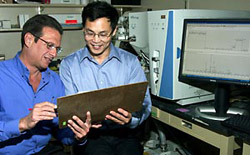Researchers at Washington University School of Medicine in St. Louis, led by heart specialist Richard Gross, M.D., Ph.D., are studying how altered fat metabolism causes heart failure in diabetic patients. They have received a five-year, $11 million grant from the National Institutes of Health to continue their investigations.

In people with diabetes, lack of insulin or insulin resistance makes it impossible for heart cells to take in enough blood sugar (glucose). So heart cells ingest and digest much more fat to fuel their huge energy demands. But that survival strategy eventually undermines the health of the heart and contributes to heart disease.
“Two-thirds of people with diabetes die of cardiovascular disease,” says Gross, professor of medicine, of chemistry and of developmental biology. “It used to be unpopular to assert that fats caused heart cell dysfunction in diabetes — it was thought that diabetic heart problems were caused by arterial plaques that diminished blood flow to the heart. But now we know that many people with diabetes develop heart failure even without having coronary artery disease. And increasingly, research is showing the detrimental role of fats in diabetic heart disease.”
Gross explains that excess fat uptake into heart cells initiates a cascade of molecular events that affects energy-producing cell structures and biochemical reactions. That makes the cells very inefficient, which weakens them and may even cause some to die. Also, extra fats that collect inside heart cells as the result of abnormal fat uptake and metabolism interfere with cellular signaling mechanisms. That in turn can affect the signals the heart uses to coordinate its continual contraction and relaxation cycles.
Central to this damaging process are enzymes called phospholipases, which break down cellular fats. Gross and coworkers in his laboratory have been on the forefront of research that has uncovered the vital role phospholipases play in heart health and heart disease. In work funded by the new grant, Gross and his colleagues will study how activation of phospholipases by the abnormal fat metabolism of diabetic heart cells causes the cells to function so poorly.
“In a diabetic heart, because of the activation of these phospholipases, the machinery becomes uncoupled so that not every energy equivalent taken in becomes useful energy for the cell,” Gross says. “So the diabetic heart is energy inefficient and in danger of failing. It’s as if you had a car that doesn’t function very well and you give it a challenge such as a long, steep slope — it’s likely that your poorly functioning car isn’t going to make it to the top.”
Gross’s research requires analysis of the fats in the chambers and membranes that make up heart cells. For that he and his research team developed sophisticated ways of telling apart the myriad forms that fat molecules possess and for measuring extremely small amounts of fat molecules. Gross and colleagues, including Xianlin Han, Ph.D., associate professor of medicine, created shotgun lipidomics, a technology that sorts fat molecules and allows researchers to identify and quantify them.
In the funded research, Han will use shotgun lipidomics and other techniques to examine the fats in diabetic heart cells. Focusing especially on the cell’s energy production machinery, Han will look for a telltale sign of distress — oxidation. The researchers think that changes in the fat composition of cellular structures make them unable to use oxygen correctly. The extra oxygen hangs around, and being highly reactive, it can damage important components of the cell.
Co-investigator Nada A. Abumrad, Ph.D., the Dr. Robert C. Atkins Professor of Medicine and Obesity Research, will be working another angle of the diabetic heart problem under the new grant. Earlier, she discovered a fat transporter — its job is to pull individual molecules of fat into cells — and she and her colleagues will research its role in diabetic cardiovascular disease. The transporter, called CD36, helps bring in the extra fats that diabetic heart cells use. But in the process, CD36 sends out abnormal signals that could interfere with the careful coordination of heart muscle cells.
Another question to be addressed with the new funding is which cellular mechanisms are affected by the decrease in insulin that occurs with diabetes. Anthony J. Muslin, M.D., the Oliver M. Langenberg Distinguished Professor of the Science and Practice of Medicine, developed mice whose pancreases stop producing insulin in a way that mimics diabetes development in people. These mice provide a better model of diabetes than previous experimental mice and will make it possible for Muslin and his colleagues to study precisely how the drop in insulin affects heart cells.
Washington University School of Medicine’s 2,100 employed and volunteer faculty physicians also are the medical staff of Barnes-Jewish and St. Louis Children’s hospitals. The School of Medicine is one of the leading medical research, teaching and patient care institutions in the nation, currently ranked third in the nation by U.S. News & World Report. Through its affiliations with Barnes-Jewish and St. Louis Children’s hospitals, the School of Medicine is linked to BJC HealthCare.